Mentoring Experience Report: Ethical Parameters and Responsibilities
VerifiedAdded on 2020/05/28
|8
|1817
|104
Report
AI Summary
This report details a student's mentoring experience as a fleet officer in the cab industry. The essay begins with an introduction to the mentoring process, focusing on ethical parameters such as mutual trust, confidentiality, commitment, and boundary maintenance. The report outlines the responsibilities of both mentors and mentees, highlighting expectations, goal setting, and feedback. It then analyzes the strengths gained, including multitasking, communication skills, and problem-solving, alongside identified weaknesses such as time management and handling criticism. The report emphasizes the effectiveness of the mentoring experience in enhancing leadership, creativity, and professional development, with measurable outcomes through seminars and team leadership. The conclusion underscores the importance of mutual contribution and enthusiasm for a successful mentor-mentee relationship, acknowledging both strengths and areas needing improvement. The report references several academic sources to support its analysis.
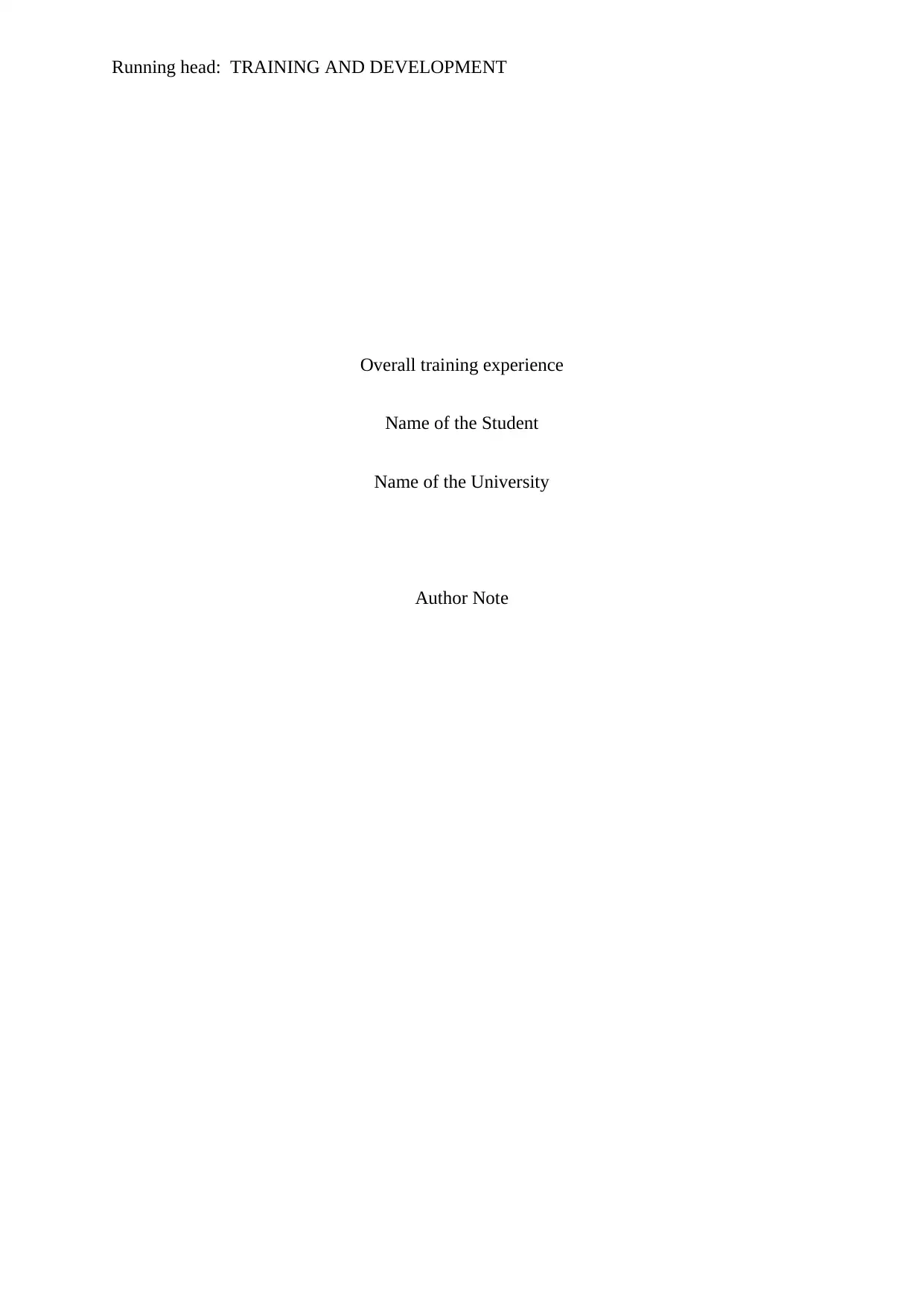
Running head: TRAINING AND DEVELOPMENT
Overall training experience
Name of the Student
Name of the University
Author Note
Overall training experience
Name of the Student
Name of the University
Author Note
Paraphrase This Document
Need a fresh take? Get an instant paraphrase of this document with our AI Paraphraser
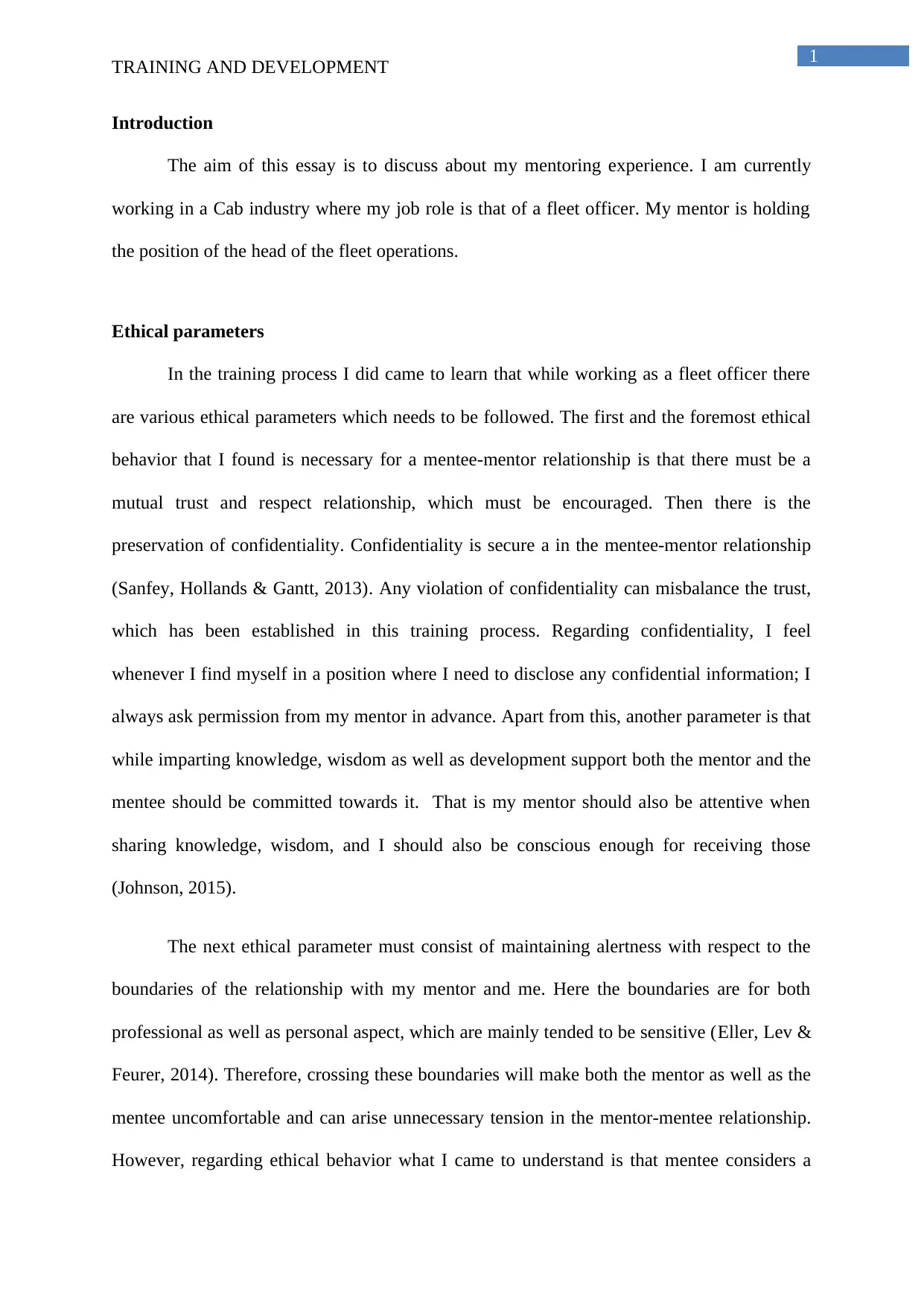
1
TRAINING AND DEVELOPMENT
Introduction
The aim of this essay is to discuss about my mentoring experience. I am currently
working in a Cab industry where my job role is that of a fleet officer. My mentor is holding
the position of the head of the fleet operations.
Ethical parameters
In the training process I did came to learn that while working as a fleet officer there
are various ethical parameters which needs to be followed. The first and the foremost ethical
behavior that I found is necessary for a mentee-mentor relationship is that there must be a
mutual trust and respect relationship, which must be encouraged. Then there is the
preservation of confidentiality. Confidentiality is secure a in the mentee-mentor relationship
(Sanfey, Hollands & Gantt, 2013). Any violation of confidentiality can misbalance the trust,
which has been established in this training process. Regarding confidentiality, I feel
whenever I find myself in a position where I need to disclose any confidential information; I
always ask permission from my mentor in advance. Apart from this, another parameter is that
while imparting knowledge, wisdom as well as development support both the mentor and the
mentee should be committed towards it. That is my mentor should also be attentive when
sharing knowledge, wisdom, and I should also be conscious enough for receiving those
(Johnson, 2015).
The next ethical parameter must consist of maintaining alertness with respect to the
boundaries of the relationship with my mentor and me. Here the boundaries are for both
professional as well as personal aspect, which are mainly tended to be sensitive (Eller, Lev &
Feurer, 2014). Therefore, crossing these boundaries will make both the mentor as well as the
mentee uncomfortable and can arise unnecessary tension in the mentor-mentee relationship.
However, regarding ethical behavior what I came to understand is that mentee considers a
TRAINING AND DEVELOPMENT
Introduction
The aim of this essay is to discuss about my mentoring experience. I am currently
working in a Cab industry where my job role is that of a fleet officer. My mentor is holding
the position of the head of the fleet operations.
Ethical parameters
In the training process I did came to learn that while working as a fleet officer there
are various ethical parameters which needs to be followed. The first and the foremost ethical
behavior that I found is necessary for a mentee-mentor relationship is that there must be a
mutual trust and respect relationship, which must be encouraged. Then there is the
preservation of confidentiality. Confidentiality is secure a in the mentee-mentor relationship
(Sanfey, Hollands & Gantt, 2013). Any violation of confidentiality can misbalance the trust,
which has been established in this training process. Regarding confidentiality, I feel
whenever I find myself in a position where I need to disclose any confidential information; I
always ask permission from my mentor in advance. Apart from this, another parameter is that
while imparting knowledge, wisdom as well as development support both the mentor and the
mentee should be committed towards it. That is my mentor should also be attentive when
sharing knowledge, wisdom, and I should also be conscious enough for receiving those
(Johnson, 2015).
The next ethical parameter must consist of maintaining alertness with respect to the
boundaries of the relationship with my mentor and me. Here the boundaries are for both
professional as well as personal aspect, which are mainly tended to be sensitive (Eller, Lev &
Feurer, 2014). Therefore, crossing these boundaries will make both the mentor as well as the
mentee uncomfortable and can arise unnecessary tension in the mentor-mentee relationship.
However, regarding ethical behavior what I came to understand is that mentee considers a
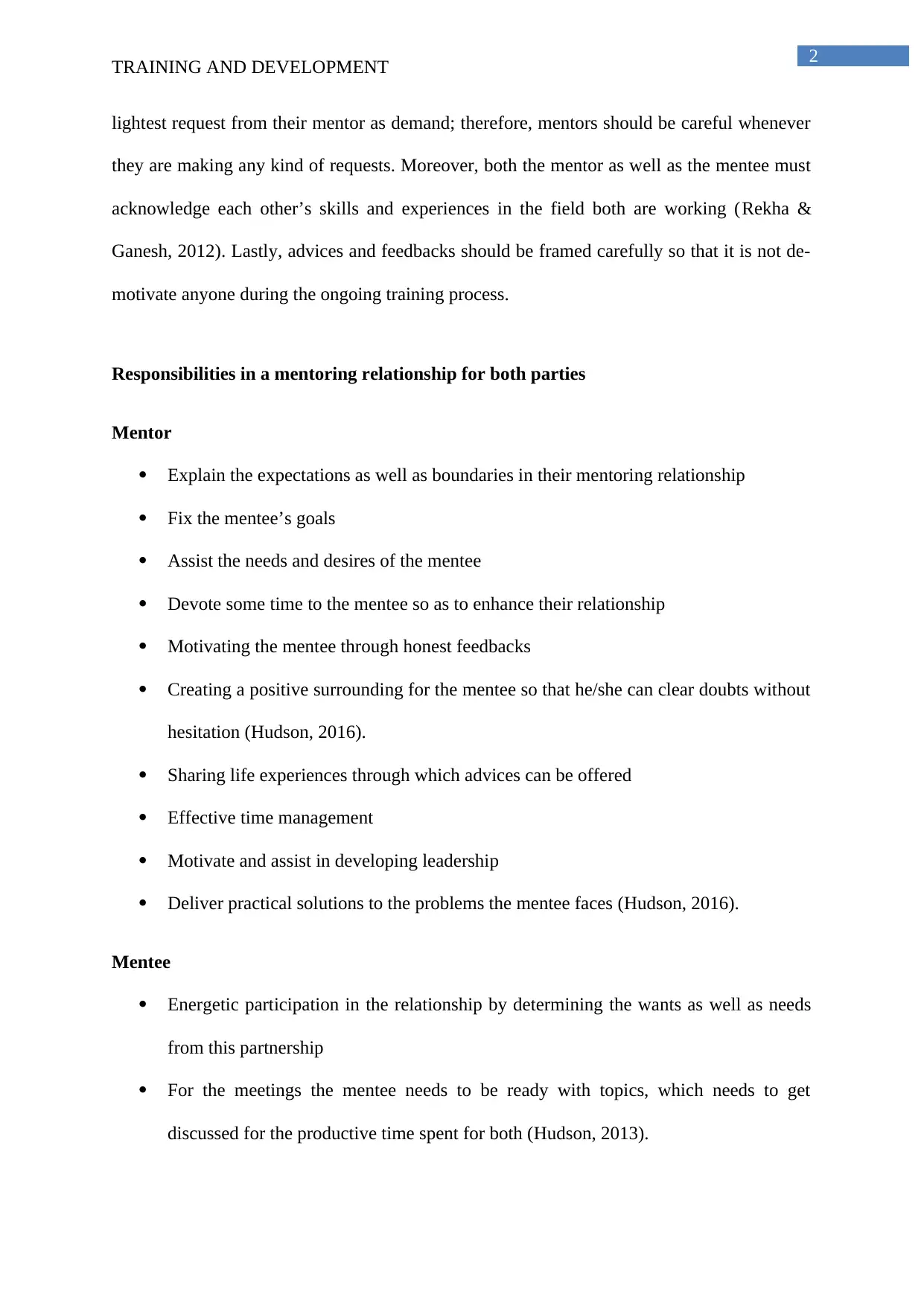
2
TRAINING AND DEVELOPMENT
lightest request from their mentor as demand; therefore, mentors should be careful whenever
they are making any kind of requests. Moreover, both the mentor as well as the mentee must
acknowledge each other’s skills and experiences in the field both are working (Rekha &
Ganesh, 2012). Lastly, advices and feedbacks should be framed carefully so that it is not de-
motivate anyone during the ongoing training process.
Responsibilities in a mentoring relationship for both parties
Mentor
Explain the expectations as well as boundaries in their mentoring relationship
Fix the mentee’s goals
Assist the needs and desires of the mentee
Devote some time to the mentee so as to enhance their relationship
Motivating the mentee through honest feedbacks
Creating a positive surrounding for the mentee so that he/she can clear doubts without
hesitation (Hudson, 2016).
Sharing life experiences through which advices can be offered
Effective time management
Motivate and assist in developing leadership
Deliver practical solutions to the problems the mentee faces (Hudson, 2016).
Mentee
Energetic participation in the relationship by determining the wants as well as needs
from this partnership
For the meetings the mentee needs to be ready with topics, which needs to get
discussed for the productive time spent for both (Hudson, 2013).
TRAINING AND DEVELOPMENT
lightest request from their mentor as demand; therefore, mentors should be careful whenever
they are making any kind of requests. Moreover, both the mentor as well as the mentee must
acknowledge each other’s skills and experiences in the field both are working (Rekha &
Ganesh, 2012). Lastly, advices and feedbacks should be framed carefully so that it is not de-
motivate anyone during the ongoing training process.
Responsibilities in a mentoring relationship for both parties
Mentor
Explain the expectations as well as boundaries in their mentoring relationship
Fix the mentee’s goals
Assist the needs and desires of the mentee
Devote some time to the mentee so as to enhance their relationship
Motivating the mentee through honest feedbacks
Creating a positive surrounding for the mentee so that he/she can clear doubts without
hesitation (Hudson, 2016).
Sharing life experiences through which advices can be offered
Effective time management
Motivate and assist in developing leadership
Deliver practical solutions to the problems the mentee faces (Hudson, 2016).
Mentee
Energetic participation in the relationship by determining the wants as well as needs
from this partnership
For the meetings the mentee needs to be ready with topics, which needs to get
discussed for the productive time spent for both (Hudson, 2013).
⊘ This is a preview!⊘
Do you want full access?
Subscribe today to unlock all pages.

Trusted by 1+ million students worldwide
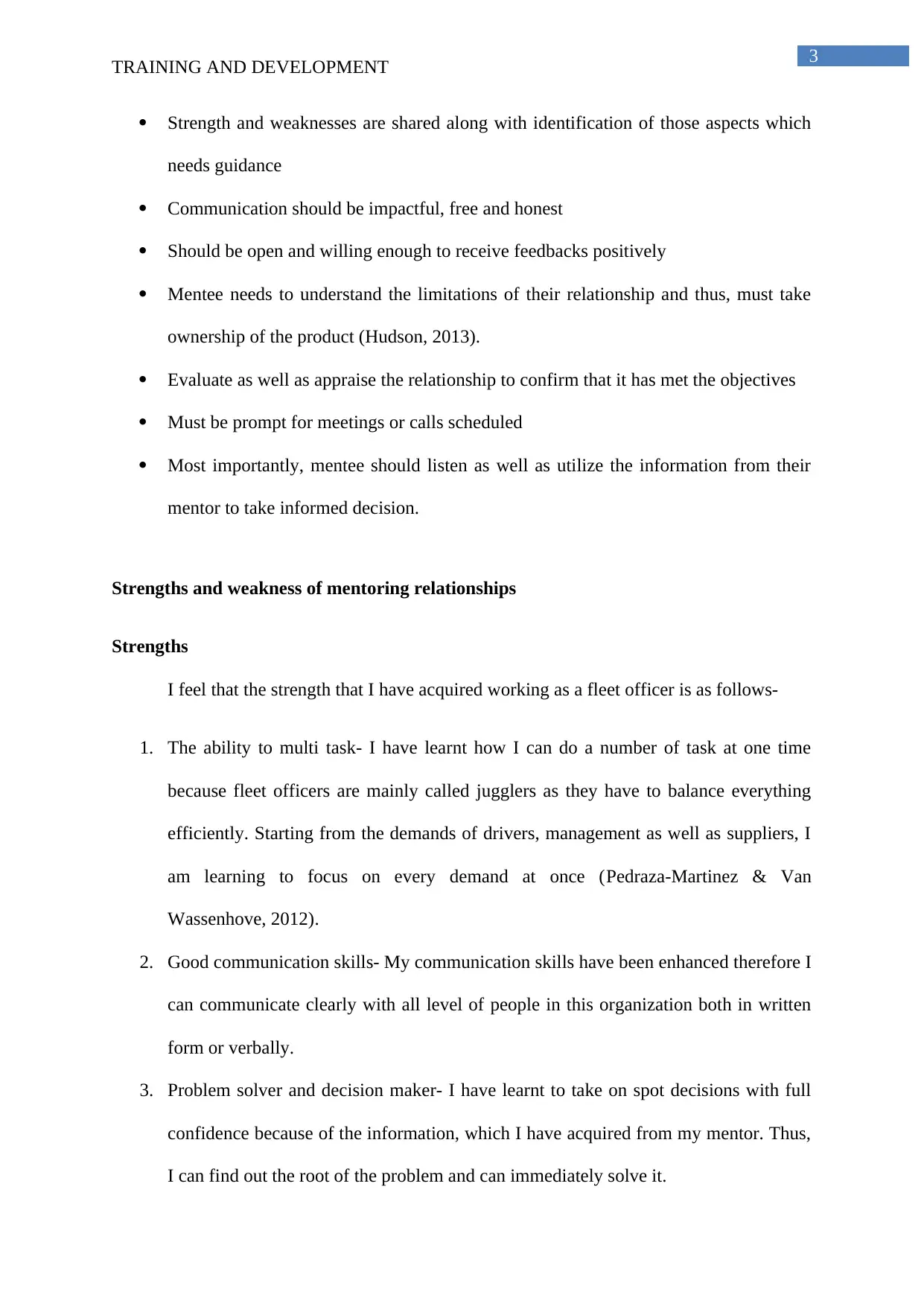
3
TRAINING AND DEVELOPMENT
Strength and weaknesses are shared along with identification of those aspects which
needs guidance
Communication should be impactful, free and honest
Should be open and willing enough to receive feedbacks positively
Mentee needs to understand the limitations of their relationship and thus, must take
ownership of the product (Hudson, 2013).
Evaluate as well as appraise the relationship to confirm that it has met the objectives
Must be prompt for meetings or calls scheduled
Most importantly, mentee should listen as well as utilize the information from their
mentor to take informed decision.
Strengths and weakness of mentoring relationships
Strengths
I feel that the strength that I have acquired working as a fleet officer is as follows-
1. The ability to multi task- I have learnt how I can do a number of task at one time
because fleet officers are mainly called jugglers as they have to balance everything
efficiently. Starting from the demands of drivers, management as well as suppliers, I
am learning to focus on every demand at once (Pedraza-Martinez & Van
Wassenhove, 2012).
2. Good communication skills- My communication skills have been enhanced therefore I
can communicate clearly with all level of people in this organization both in written
form or verbally.
3. Problem solver and decision maker- I have learnt to take on spot decisions with full
confidence because of the information, which I have acquired from my mentor. Thus,
I can find out the root of the problem and can immediately solve it.
TRAINING AND DEVELOPMENT
Strength and weaknesses are shared along with identification of those aspects which
needs guidance
Communication should be impactful, free and honest
Should be open and willing enough to receive feedbacks positively
Mentee needs to understand the limitations of their relationship and thus, must take
ownership of the product (Hudson, 2013).
Evaluate as well as appraise the relationship to confirm that it has met the objectives
Must be prompt for meetings or calls scheduled
Most importantly, mentee should listen as well as utilize the information from their
mentor to take informed decision.
Strengths and weakness of mentoring relationships
Strengths
I feel that the strength that I have acquired working as a fleet officer is as follows-
1. The ability to multi task- I have learnt how I can do a number of task at one time
because fleet officers are mainly called jugglers as they have to balance everything
efficiently. Starting from the demands of drivers, management as well as suppliers, I
am learning to focus on every demand at once (Pedraza-Martinez & Van
Wassenhove, 2012).
2. Good communication skills- My communication skills have been enhanced therefore I
can communicate clearly with all level of people in this organization both in written
form or verbally.
3. Problem solver and decision maker- I have learnt to take on spot decisions with full
confidence because of the information, which I have acquired from my mentor. Thus,
I can find out the root of the problem and can immediately solve it.
Paraphrase This Document
Need a fresh take? Get an instant paraphrase of this document with our AI Paraphraser
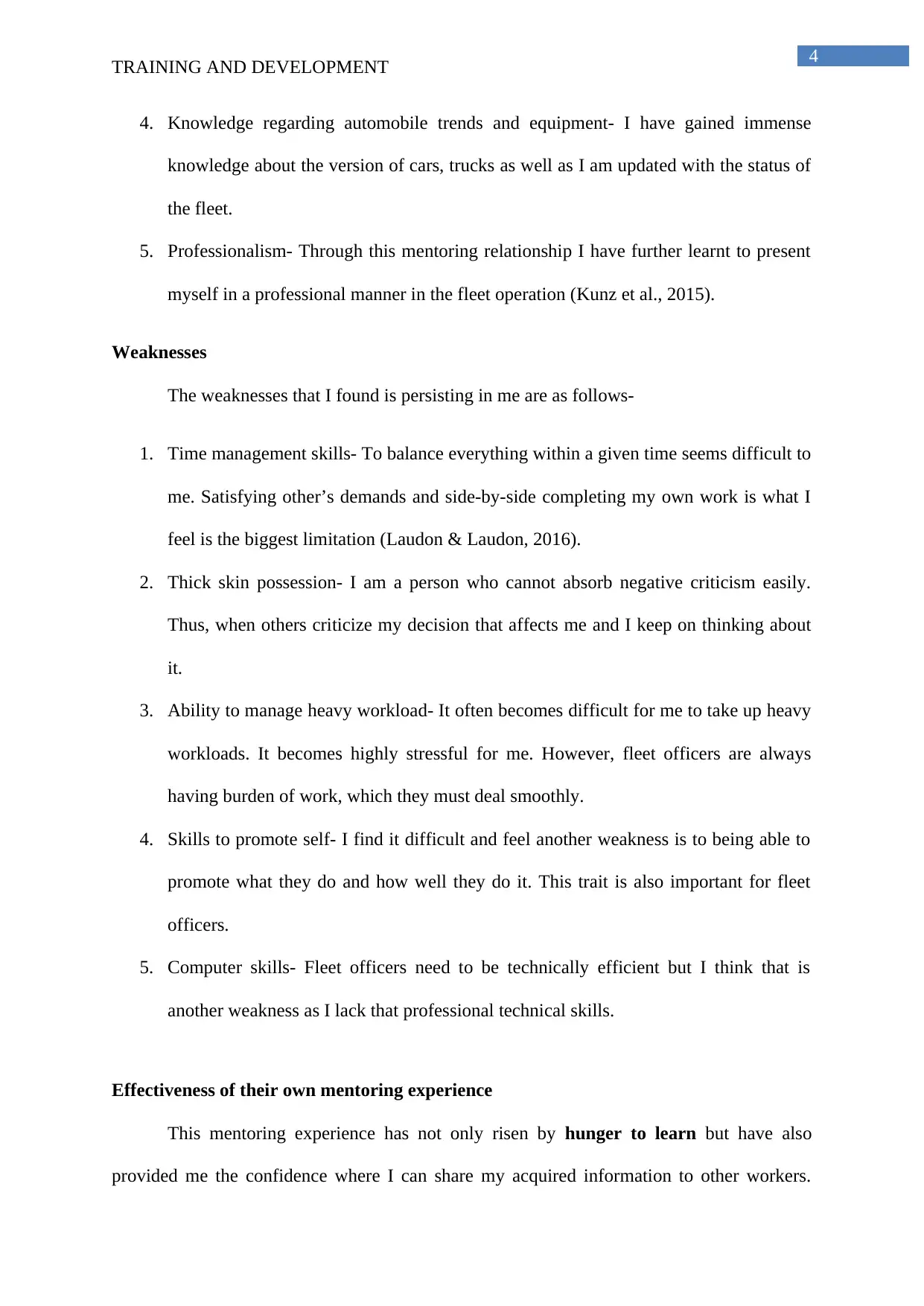
4
TRAINING AND DEVELOPMENT
4. Knowledge regarding automobile trends and equipment- I have gained immense
knowledge about the version of cars, trucks as well as I am updated with the status of
the fleet.
5. Professionalism- Through this mentoring relationship I have further learnt to present
myself in a professional manner in the fleet operation (Kunz et al., 2015).
Weaknesses
The weaknesses that I found is persisting in me are as follows-
1. Time management skills- To balance everything within a given time seems difficult to
me. Satisfying other’s demands and side-by-side completing my own work is what I
feel is the biggest limitation (Laudon & Laudon, 2016).
2. Thick skin possession- I am a person who cannot absorb negative criticism easily.
Thus, when others criticize my decision that affects me and I keep on thinking about
it.
3. Ability to manage heavy workload- It often becomes difficult for me to take up heavy
workloads. It becomes highly stressful for me. However, fleet officers are always
having burden of work, which they must deal smoothly.
4. Skills to promote self- I find it difficult and feel another weakness is to being able to
promote what they do and how well they do it. This trait is also important for fleet
officers.
5. Computer skills- Fleet officers need to be technically efficient but I think that is
another weakness as I lack that professional technical skills.
Effectiveness of their own mentoring experience
This mentoring experience has not only risen by hunger to learn but have also
provided me the confidence where I can share my acquired information to other workers.
TRAINING AND DEVELOPMENT
4. Knowledge regarding automobile trends and equipment- I have gained immense
knowledge about the version of cars, trucks as well as I am updated with the status of
the fleet.
5. Professionalism- Through this mentoring relationship I have further learnt to present
myself in a professional manner in the fleet operation (Kunz et al., 2015).
Weaknesses
The weaknesses that I found is persisting in me are as follows-
1. Time management skills- To balance everything within a given time seems difficult to
me. Satisfying other’s demands and side-by-side completing my own work is what I
feel is the biggest limitation (Laudon & Laudon, 2016).
2. Thick skin possession- I am a person who cannot absorb negative criticism easily.
Thus, when others criticize my decision that affects me and I keep on thinking about
it.
3. Ability to manage heavy workload- It often becomes difficult for me to take up heavy
workloads. It becomes highly stressful for me. However, fleet officers are always
having burden of work, which they must deal smoothly.
4. Skills to promote self- I find it difficult and feel another weakness is to being able to
promote what they do and how well they do it. This trait is also important for fleet
officers.
5. Computer skills- Fleet officers need to be technically efficient but I think that is
another weakness as I lack that professional technical skills.
Effectiveness of their own mentoring experience
This mentoring experience has not only risen by hunger to learn but have also
provided me the confidence where I can share my acquired information to other workers.
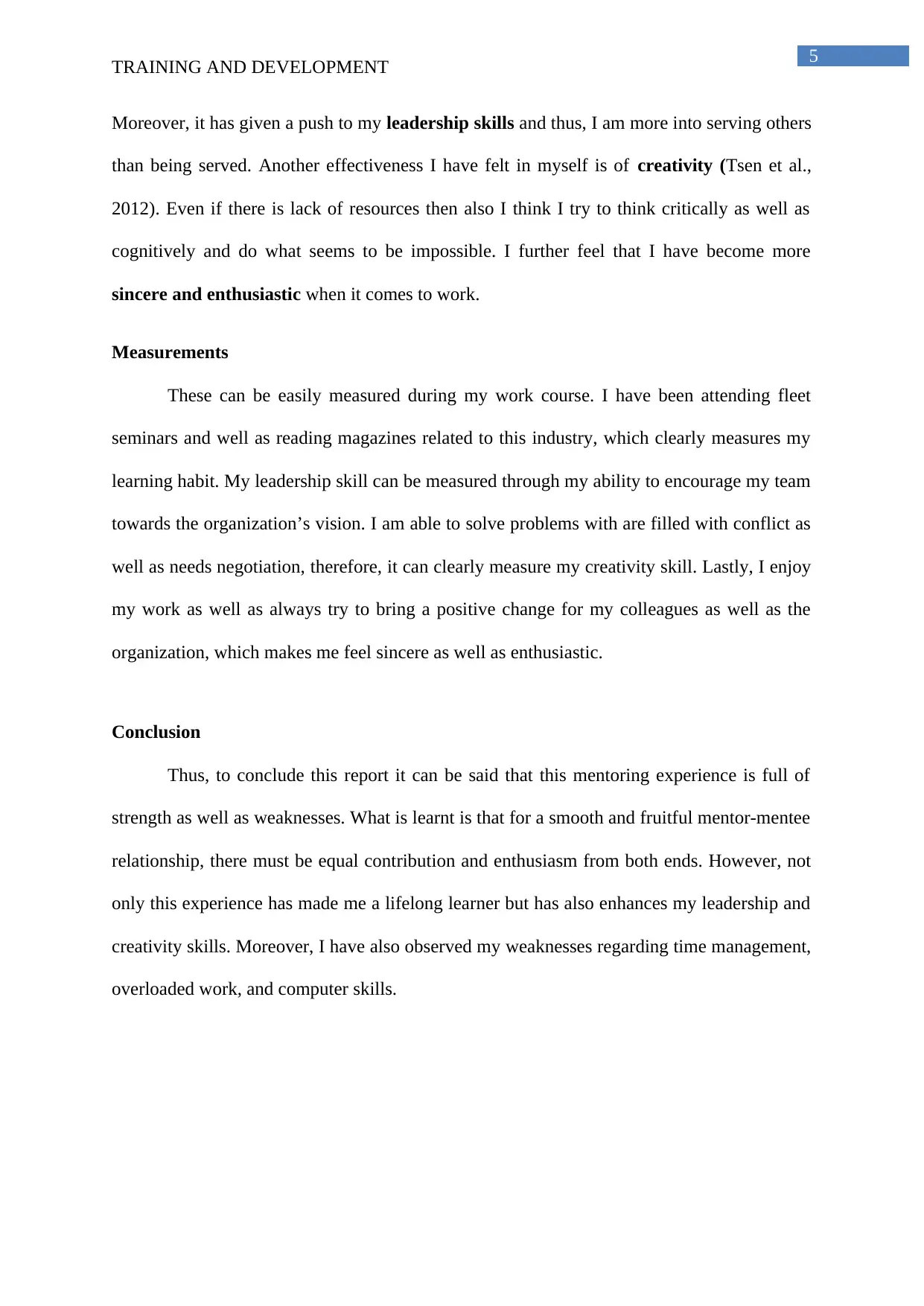
5
TRAINING AND DEVELOPMENT
Moreover, it has given a push to my leadership skills and thus, I am more into serving others
than being served. Another effectiveness I have felt in myself is of creativity (Tsen et al.,
2012). Even if there is lack of resources then also I think I try to think critically as well as
cognitively and do what seems to be impossible. I further feel that I have become more
sincere and enthusiastic when it comes to work.
Measurements
These can be easily measured during my work course. I have been attending fleet
seminars and well as reading magazines related to this industry, which clearly measures my
learning habit. My leadership skill can be measured through my ability to encourage my team
towards the organization’s vision. I am able to solve problems with are filled with conflict as
well as needs negotiation, therefore, it can clearly measure my creativity skill. Lastly, I enjoy
my work as well as always try to bring a positive change for my colleagues as well as the
organization, which makes me feel sincere as well as enthusiastic.
Conclusion
Thus, to conclude this report it can be said that this mentoring experience is full of
strength as well as weaknesses. What is learnt is that for a smooth and fruitful mentor-mentee
relationship, there must be equal contribution and enthusiasm from both ends. However, not
only this experience has made me a lifelong learner but has also enhances my leadership and
creativity skills. Moreover, I have also observed my weaknesses regarding time management,
overloaded work, and computer skills.
TRAINING AND DEVELOPMENT
Moreover, it has given a push to my leadership skills and thus, I am more into serving others
than being served. Another effectiveness I have felt in myself is of creativity (Tsen et al.,
2012). Even if there is lack of resources then also I think I try to think critically as well as
cognitively and do what seems to be impossible. I further feel that I have become more
sincere and enthusiastic when it comes to work.
Measurements
These can be easily measured during my work course. I have been attending fleet
seminars and well as reading magazines related to this industry, which clearly measures my
learning habit. My leadership skill can be measured through my ability to encourage my team
towards the organization’s vision. I am able to solve problems with are filled with conflict as
well as needs negotiation, therefore, it can clearly measure my creativity skill. Lastly, I enjoy
my work as well as always try to bring a positive change for my colleagues as well as the
organization, which makes me feel sincere as well as enthusiastic.
Conclusion
Thus, to conclude this report it can be said that this mentoring experience is full of
strength as well as weaknesses. What is learnt is that for a smooth and fruitful mentor-mentee
relationship, there must be equal contribution and enthusiasm from both ends. However, not
only this experience has made me a lifelong learner but has also enhances my leadership and
creativity skills. Moreover, I have also observed my weaknesses regarding time management,
overloaded work, and computer skills.
⊘ This is a preview!⊘
Do you want full access?
Subscribe today to unlock all pages.

Trusted by 1+ million students worldwide
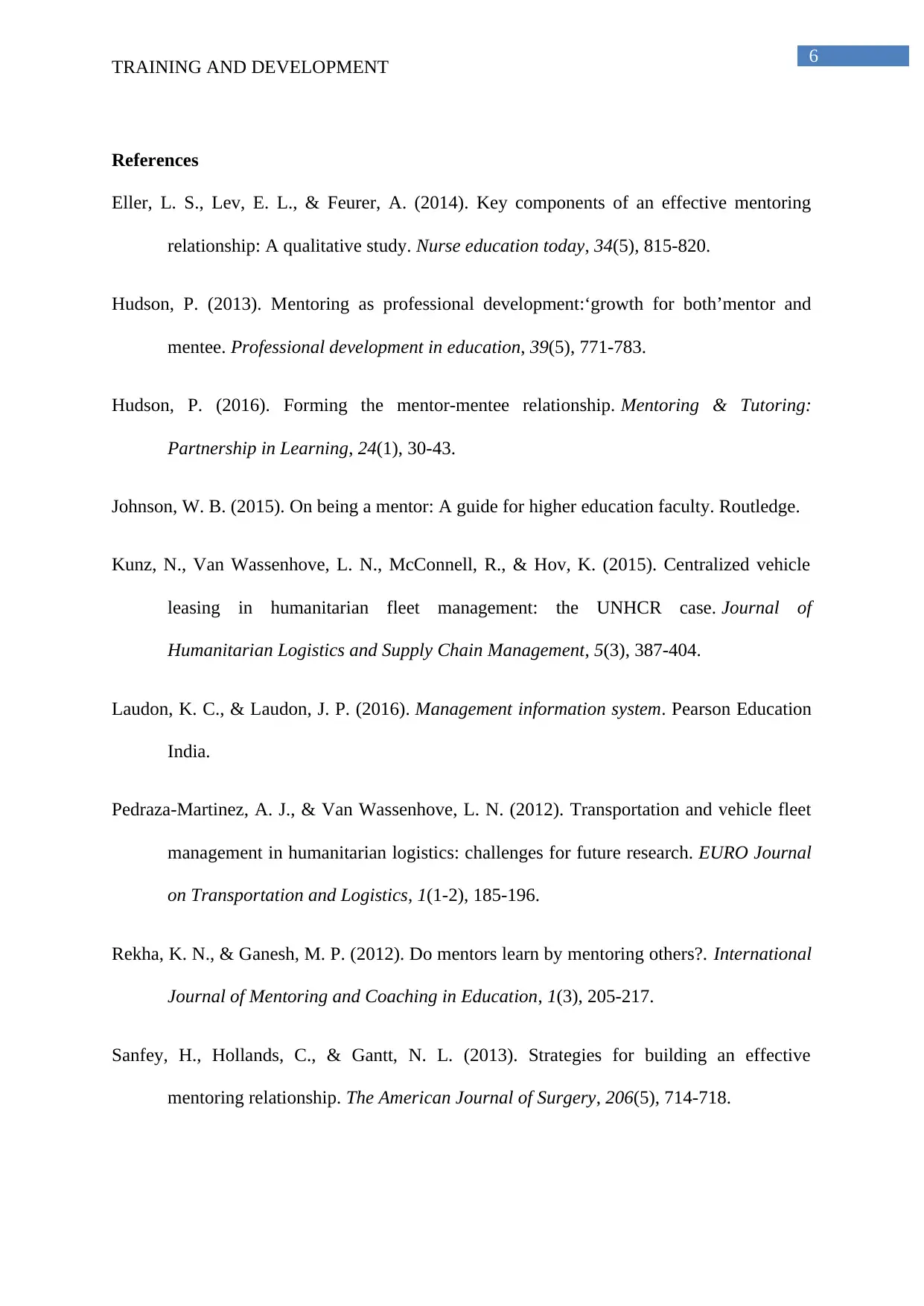
6
TRAINING AND DEVELOPMENT
References
Eller, L. S., Lev, E. L., & Feurer, A. (2014). Key components of an effective mentoring
relationship: A qualitative study. Nurse education today, 34(5), 815-820.
Hudson, P. (2013). Mentoring as professional development:‘growth for both’mentor and
mentee. Professional development in education, 39(5), 771-783.
Hudson, P. (2016). Forming the mentor-mentee relationship. Mentoring & Tutoring:
Partnership in Learning, 24(1), 30-43.
Johnson, W. B. (2015). On being a mentor: A guide for higher education faculty. Routledge.
Kunz, N., Van Wassenhove, L. N., McConnell, R., & Hov, K. (2015). Centralized vehicle
leasing in humanitarian fleet management: the UNHCR case. Journal of
Humanitarian Logistics and Supply Chain Management, 5(3), 387-404.
Laudon, K. C., & Laudon, J. P. (2016). Management information system. Pearson Education
India.
Pedraza-Martinez, A. J., & Van Wassenhove, L. N. (2012). Transportation and vehicle fleet
management in humanitarian logistics: challenges for future research. EURO Journal
on Transportation and Logistics, 1(1-2), 185-196.
Rekha, K. N., & Ganesh, M. P. (2012). Do mentors learn by mentoring others?. International
Journal of Mentoring and Coaching in Education, 1(3), 205-217.
Sanfey, H., Hollands, C., & Gantt, N. L. (2013). Strategies for building an effective
mentoring relationship. The American Journal of Surgery, 206(5), 714-718.
TRAINING AND DEVELOPMENT
References
Eller, L. S., Lev, E. L., & Feurer, A. (2014). Key components of an effective mentoring
relationship: A qualitative study. Nurse education today, 34(5), 815-820.
Hudson, P. (2013). Mentoring as professional development:‘growth for both’mentor and
mentee. Professional development in education, 39(5), 771-783.
Hudson, P. (2016). Forming the mentor-mentee relationship. Mentoring & Tutoring:
Partnership in Learning, 24(1), 30-43.
Johnson, W. B. (2015). On being a mentor: A guide for higher education faculty. Routledge.
Kunz, N., Van Wassenhove, L. N., McConnell, R., & Hov, K. (2015). Centralized vehicle
leasing in humanitarian fleet management: the UNHCR case. Journal of
Humanitarian Logistics and Supply Chain Management, 5(3), 387-404.
Laudon, K. C., & Laudon, J. P. (2016). Management information system. Pearson Education
India.
Pedraza-Martinez, A. J., & Van Wassenhove, L. N. (2012). Transportation and vehicle fleet
management in humanitarian logistics: challenges for future research. EURO Journal
on Transportation and Logistics, 1(1-2), 185-196.
Rekha, K. N., & Ganesh, M. P. (2012). Do mentors learn by mentoring others?. International
Journal of Mentoring and Coaching in Education, 1(3), 205-217.
Sanfey, H., Hollands, C., & Gantt, N. L. (2013). Strategies for building an effective
mentoring relationship. The American Journal of Surgery, 206(5), 714-718.
Paraphrase This Document
Need a fresh take? Get an instant paraphrase of this document with our AI Paraphraser
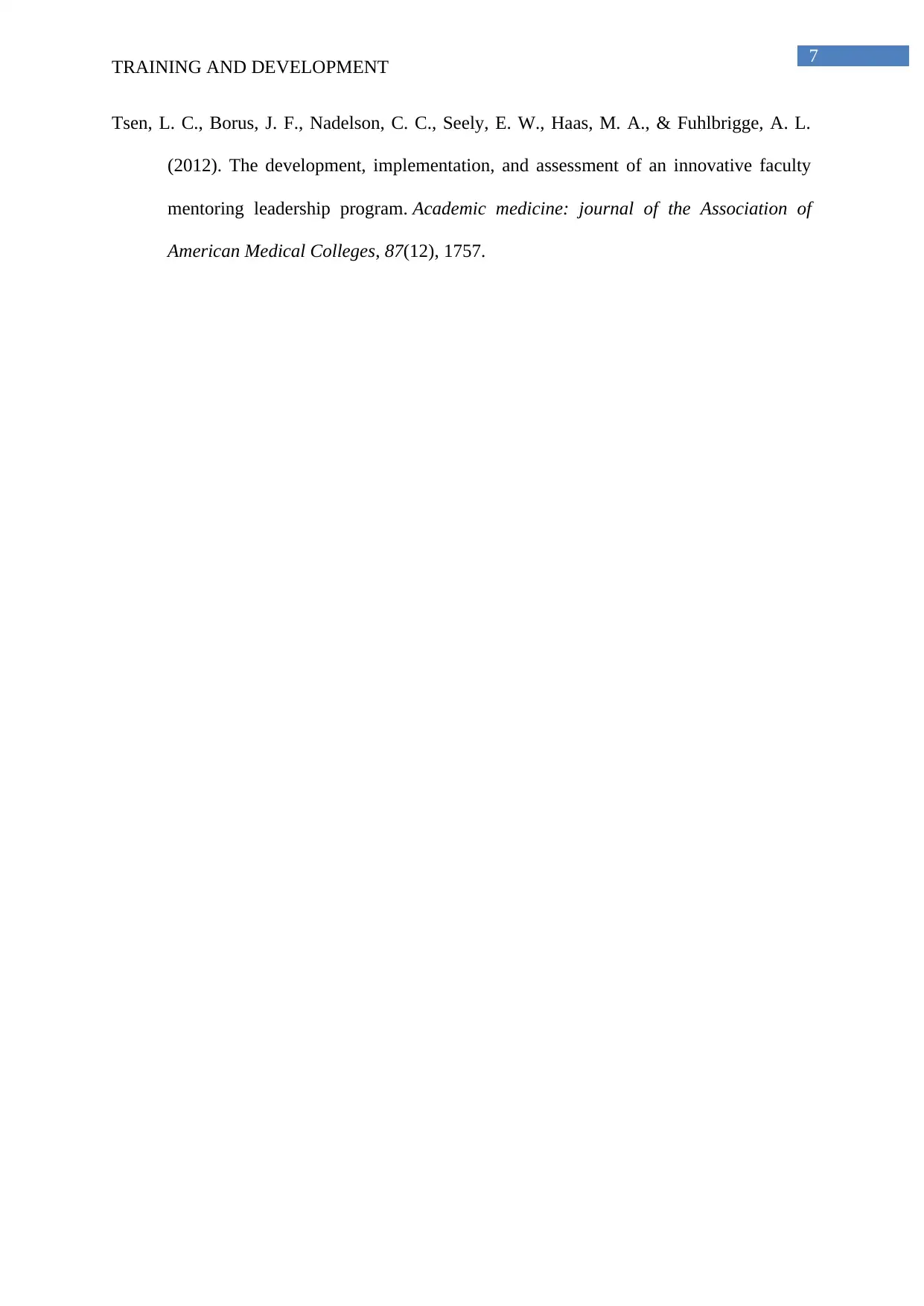
7
TRAINING AND DEVELOPMENT
Tsen, L. C., Borus, J. F., Nadelson, C. C., Seely, E. W., Haas, M. A., & Fuhlbrigge, A. L.
(2012). The development, implementation, and assessment of an innovative faculty
mentoring leadership program. Academic medicine: journal of the Association of
American Medical Colleges, 87(12), 1757.
TRAINING AND DEVELOPMENT
Tsen, L. C., Borus, J. F., Nadelson, C. C., Seely, E. W., Haas, M. A., & Fuhlbrigge, A. L.
(2012). The development, implementation, and assessment of an innovative faculty
mentoring leadership program. Academic medicine: journal of the Association of
American Medical Colleges, 87(12), 1757.
1 out of 8
Related Documents
Your All-in-One AI-Powered Toolkit for Academic Success.
+13062052269
info@desklib.com
Available 24*7 on WhatsApp / Email
![[object Object]](/_next/static/media/star-bottom.7253800d.svg)
Unlock your academic potential
Copyright © 2020–2026 A2Z Services. All Rights Reserved. Developed and managed by ZUCOL.



